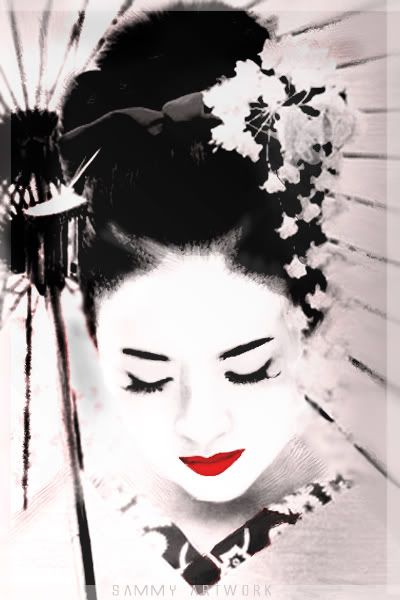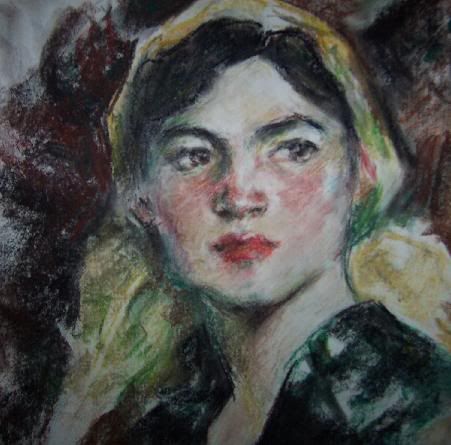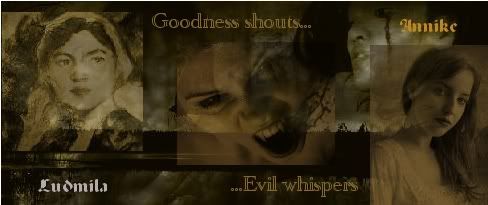Post by zamara on May 10, 2010 23:43:40 GMT -5
Name: Ludmila Antonovna Zhukova
Nick Names or Alias: Nadezhda (Nadya, Nadyinka); Linda Morris; Elle Anthony
Age: 158
Aesthetic Age: 28
Gender: Female
Sexual Preferances: Straight
LClan: Brujah
If Other: N/A
Sect: Camarilla
If Independant Faction: N/A Rank: Ancillea
Generation: 9th
Powers (Disciplines):
Intelligence: 8
Speed: 7
Leadership: 8
Melee: 8
Unarmed: 13
Ranged: 2
History:
Nick Names or Alias: Nadezhda (Nadya, Nadyinka); Linda Morris; Elle Anthony
Age: 158
Aesthetic Age: 28
Gender: Female
Sexual Preferances: Straight
LClan: Brujah
If Other: N/A
Sect: Camarilla
If Independant Faction: N/A Rank: Ancillea
Generation: 9th
Powers (Disciplines):
Potence ****Deformities:
Celerity ***
Presence ***
A scar down her right check from the bayonet of a czarist rifle. She is very proud of it.Derangement(s):
NoneMisc.:
(Merits/Flaws)Appearance:
- Iron Will (resistance to mind-control)
- Inoffensive to Animals (in fact, she has a pet dog named Laika)
- Haunted
Black hair, blue eyes. Short and graceful, medium-boned. She looks like an athlete—that is, she has very little body fat, but she also has rather small breasts and few curves (she is somewhat masculine in build). The look in her eyes is very direct, almost harsh. (She has little to do with social niceties, seeing “small talk” and “politeness” as a waste of time.)Fashion Sense/Style:
She dresses rather masculinely, only wearing skirts when she is in a particular nostalgic mood. Normally she’ll wear combat boots (ones that are practical as well as fashionable), jeans, and a leather jacket. Occasionally she’ll wear a red ribbon or scarf, in honor of her past in the Bolshevik party.Personality:
She has altruistic goals, but tends to neglect the details in favor of an overarching whole. (This goal used to be communism, but is somewhat confused as of late…) That is, she’ll favor “the greater good” over the good of individual people. And since she is no longer a “person,” her moral compass gets very confused. She has a code of honor, though, and dislikes hurting the innocent. She loves to prey on criminals she finds on the street, seeing her murder of them as a public service. Ludmila sees herself as a kind of superhero when she does such things.Physical-Strength: 12
More conventionally, she feeds on members of the Red Apple Fellowship (RAF, after the historical Red Army Faction), a socialist society whose meetings she likes to frequent. She does not kill any of these kine, however. (And as most of them are college students and heavy drinkers, they tend to think little of blacking out every so often.) Certain members of the RAF are among the closest she has to “friends.” She takes an almost maternal interest in the kine who show keen philosophical insight at the club, as they remind her of old friends and comrades from her human days.
Being a Brujah, Ludmila likes a good fight. But she also likes a good cause. Since her old cause—Soviet communism—fell through in 1989, she’s been a bit depressed. But now she is ready to find a new cause to champion—and new skulls to crush in the name of it.
Intelligence: 8
Speed: 7
Leadership: 8
Melee: 8
Unarmed: 13
Ranged: 2
History:
Childhood (1852-1873)
Ludmila was born the first of four children, all girls. (Her father was understandably disappointed.) Her family was rather wealthy (part of imperial Russia’s almost-nonexistent middle class), so she was educated by a governess for the first twelve years of her life. Her keen interest in her studies (particularly history and politics, as she could care less about theology and classical languages) impressed her father, who taught her how to play chess and allowed her to read from his private study. When she turned eleven she attended the Rodionovsky Institute for Women in Kazan for the following six years. When she returned, she was filled with the ambition to do something no other woman of Kazan had done. Her first impulse would have been politics—she wanted to be looked upon and admired. She’d gotten used to debating while at the Institute and she enjoyed the feeling of all eyes on her. But she didn’t entertain her dreams for politics, as that was completely unheard of. What she had heard of, however, was women studying medicine—a field strictly for men.
As women were not allowed to study medicine in Russia, Ludmila asked her father for permission to study in the more liberal Switzerland. Her father refused outright. She spent months hoping to change his mind, but it was unyielding.
She spent the next year on a different mission. She dressed up, went to church, and by all appearances seemed more ladylike, the delusion of studying medicine forgotten. At the end of the year, she had secured a proposal from Oleg Antonov, a timid yet wealthy man from St. Petersburg. He was perfect for her purposes.
When she married him, he proved more malleable than her father and eventually allowed her to study at the University of Zurich’s Department of Medicine. Once there, she befriended a group of politically minded young Russian women. Many of these women were budding Marxists. As Ludmila grew more interested in Marxism, she had trouble realizing that instead of being a good person who happened to be wealthy, she was a participant in an evil system and thus was “evil” herself. The idea horrified her, so she embraced Marxism and resolved to be part of the “revolutionary vanguard” of intelligentsia that would free the peasants of Russia.
In 1873, the Department of Medicine expelled its female students on the rumor that they were using their newfound medical knowledge to perform abortions on themselves. Ludmila returned to Russia to work as a physician’s assistant. She divorced her husband and travelled around dispensing socialist propaganda. In the late 1870s, she became involved in Narodnaya Volya (the People’s Will organization) and later helped plan the assassination of Czar Alexander II. After the successful attempt, she kept a low profile.
But not low enough. A police informer discovered her at a political meeting in 1883, leading to her arrest and imprisonment. A year later, she was sentenced to death.
Death and Rebirth (1873-1905)
She was saved by a man she knew only as “Fedor.” At first she thought he was a guard, as he had access to her solitary cell, but he did not patrol as the guards did. Then she thought he was a spy, perhaps an agent of the czar’s Okhrana, but he never asked her about her comrades or her secret work.
Instead he spoke philosophically with her. “You are going to die,” he told her. “How does that make you feel?”
“I did a good and worthwhile thing,” she swore. “Soon the czar’s oppressive empire will come crumbling down.”
“But you’re still afraid,” he taunted, baring his white teeth. “No one wants to die.”
She spat at him. “I don’t care!”
He left her alone for weeks after that. Then, the night before her execution, he came and said: “Your sentence has been reduced. I will come to you in Siberia.”
Sure enough, her sentence had been reduced to twenty years’ exile in Siberia. She lived in a solitary village for months. By the time Fedor arrived, she had caught pneumonia—a death sentence in such a remote land.
“What are you doing here?” she coughed. “Why did you help me?”
“Because it will be fun,” he grinned.
“Fun?” Did he mean for her to become his then? She was about to die. And if she lived…very well—she could bide her time. She tolerated a loveless marriage for the Cause—she could do this.
“It will be fun,” he repeated, “To watch the common man tremble at a woman like you. You’re too amusing to die now.”
She turned away from him.
“Tell me you want my help,” he urged. “I can save you. All you have to do is ask. All you have to do is…beg.”
Ludmila closed her eyes. She could not degrade herself like that. She’d never shown such submission to anyone—not even him, back when she was in her cell faced with hanging.
But this was not an execution. It was an ignominious death in a wasteland, doing nothing that mattered to anyone, nothing to be remembered for. She couldn’t stand the thought of it.
“Help me,” she forced out. “I’m begging you.”
He Embraced her that very night. He spent the next years teaching her the rudiments of kindred life, her role as a new Brujah, how to hunt and kill to feed. She did not need to keep up with the Masquerade in the tundras of Siberia, beyond even the prison camps and villages, where only the Tartars roamed. She prowled and hunted across the snows—free for the first time in her life.
She grew attached to her enigmatic sire, and in return he shared stories of his past as a medieval Russian nobleman. He spoke fondly of those days, of how easy it was to feed on the serfs of his estate. Something of those words struck a chord with the former Marxist—perhaps the way this aristocraft had sucked the lifeblood of the poor, quite literally.
She began to remember her days as a human—the drudgery and confinement, yes, but also the hopes and dreams and passions. She eventually left her sire and made her way back to civilization. She wandered around and saw the unrest of the people and opulence of the royal court—of Czar Nicholas II, buying Faberge eggs for his children while the peasants starved. She found herself in St. Petersburg on Bloody Sunday, watching the kine get massacred merely for wanting representation in a parliament.
She began to work for the revolution once again. Her comrades knew her as Nadya, a keen and quiet woman who met with them only at night. But as most subversive meetings took place under the cover of darkness, she met with no one’s suspicions.
Hopes Fulfilled (1917-1989)
The revolution came to fruition in 1917 with the triumph of the Bolshevik party. Ludmila had wisely hedged her bets and not made political enemies of the Bolsheviks or Lenin, their irascible and cunning leader. In fact, Comrade Lenin was rather impressed by the (supernatural) charisma of the vampire and invited her to a post in the new government.
Ludmila, unable to set foot into daylight—let alone attend morning meetings—politely declined. But she continued her dauntless work for the Party through contributions to newspapers and meetings with the socialists of other countries. (Her ability to captivate the kine made her ideal in infiltrating hostile nations.)
She played a similar role throughout the generations—that of spy and political theorist. “Comrade Nadya” wrote many letters that had the ear of even Politburo members—and her exploits of espionage had even more influence. Some say that she broke the Manhattan Project, while others claim that she ended the Cuban Missile Crisis. These are not true—not entirely, that is—but she was an unsung Soviet hero nonetheless. Other than a brief crisis of faith during the reign of Josef Stalin, Ludmila worked tirelessly for her kine cause.
She associated only a little with her fellow kindred—just enough to know what was going on. She never sired any progeny or created any ghouls (she found the idea of “blood bonding” a little repulsive.) She learned more about the clans and used her kindred contacts to further her communist goals. She recruited several Brujah to her cause, in fact, and championed the idea of a society of equal vampires with no need of “princes.” But she was never too vocal about this, as she knew enough to know that a neonate like herself could easily be removed.
The Fallen Dream (1989-2009)
Too young for kindred politics, Ludmila engaged in the mortal variety. But her hopes fell with each passing day as ineffectual premier after premier led the Soviet people. At last, the standoff between Yeltsin and Gorbachev ended with the fall of her dream.
Once again, Ludmila retreated into Siberia. She searched for word of her sire, but found no trace of him. So she lived in solitude, preying on the occasional Tartar tribesman as she waited for the world to pass. She eventually ensnared a tribe of Tartars as her ghouls and allowed them to guard her as she sank into torpor. She once would have found such enslavement of the human will horrific, but now she cared little.
The Dreamer (2010)
A few years later, she awoke. Russia only depressed her now, so she moved to America—once the hated enemy, now a strange refuge. Ludmila knows enough of her own psychology to recognize her need for beliefs and a political cause, so she aims to find one in New York, the city of eternal light and countless contradiction.







